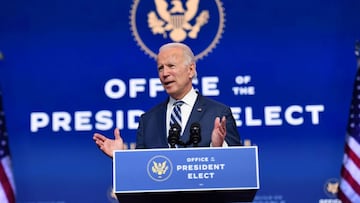Biden mask mandate: which states don't have a rule?
President-elect Joe Biden has announced his covid-19 task force to tackle the surging spread of the virus and plans to institute a nationwide mask mandate.

Over the course of the coronavirus pandemic the wearing of masks has become highly politicized despite proven efficiency at reducing the spread of covid-19. President-elect Joe Biden will begin calling governors and mayors around the US to appeal to them to implement mask mandates in their states.
Joe Biden is also looking to apply a mask mandate in all federal buildings according to a senior advisor that briefed NBC News. This is something that President Donald Trump has failed to do even as new outbreaks are hitting senior members of his administration the most recent ones Ben Carson at Housing and Urban Development and his chief of staff Mark Meadows.
On Monday Joe Biden presented his coronavirus task force. Joe Biden's plans include testing, contract tracing and vaccines where there has been a light of hope with the most recent results of the Pfizer vaccine trials being 90 percent effective.
No unified approach to mandates
States and territories that do have statewide mandates, the rules are varying on how it is applied and enforced. The rules can range from only employees to everywhere in public. As well, some governors have applied statewide mandates only for them to be made toothless by the legislature before they can be imposed. This has presented a unique situation where the effectiveness of masks can be scientifically measured.
Wearing face masks works
In Kansas before the Governor could put into effect the statewide mask mandate the Legislature made it have an opt-out option for counties. The Institute for Policy and Social Research at the University of Kansas was able to do a “natural experiment” on the effectiveness of masks and its results showed that counites that implemented the policy saw 50 percent less spread than counties without mask mandates, and even counties that had partial mandates saw a 30 percent reduction.
States still refuse to require mask wearing
At present 15 states do not have a statewide mask mandate. Currently one of which has none whatsoever, South Dakota. Sioux Falls, South Dakota will be voting this evening to decide if the city will implement an ordinance to require residents to wear a mask in public or face a $50 fine. The debate over wearing masks, just as in Sioux Falls, has divided communities across the US as people feel their freedoms being infringed upon.
Related stories
Currently four of the top five infection rates are in states that do not have a statewide mask mandate according to the New York Times covid-19 tracker.
Below is a handy list of states that do not have a statewide mandate requiring residents to wear a face mask with some of the varying rules from CNN. You can also check the AARP’s tracker or the Mask4All list which updates daily.
Alaska: Alaska does not require the use of masks, limit group size or business operations. All the state does is encourage Alaskans to do their part to limit the spread of Covid-19, recommending that residents practice social distancing and wear a mask, without any mandate. The mayor of Anchorage has signed an order requiring people to wear face coverings in public.
Arizona: Gov. Doug Ducey, a Republican, allows individual counties to mandate a mask, but does not have a statewide initiative. Scottsdale was the first to make masks mandatory starting June 19. Other major municipalities with requirements include Phoenix, Tucson and Flagstaff.
Florida: There is no statewide mask requirement.
Georgia: Statewide, masks are required for some essential employees, including restaurants and personal care services employees. Several counties and cities have mask mandates.
Idaho: The state does not have a requirement; several municipalities do, including Boise.
Iowa: No statewide requirement.
Mississippi: On September 4, Gov. Tate Reeves, a Republican, lifted the state face covering requirement. Just over a month later and amid rising case numbers, Reeves signed an executive order requiring face coverings in counties with higher Covid-19 case numbers. That order expires on Nov. 11.
Missouri: No statewide requirement.
Nebraska: No statewide mandate, but clients and staff in barbershops, salons, tattoo parlors and massage parlors must wear masks, as part of the current Directed Health Measure requirements.
North Dakota: No statewide requirement. Fargo has a local requirement.
Oklahoma: The city council in Oklahoma City voted in July to approve an emergency public safety ordinance requiring face coverings in indoor public places.
South Carolina: Several counties and cities, including Charleston and Columbia, have mask mandates.
South Dakota: Gov. Kristi Noem, a Republican, has taken a hands-off approach to Covid-19. In October, she wrote in an op-ed that the government should not mandate a mask requirement. “As I’ve said before, if folks want to wear a mask, they should be free to do so,” she wrote. “Similarly, those who don’t want to wear a mask shouldn’t be shamed into wearing one.” South Dakota is second to North Dakota in the number of coronavirus cases per 100,000 people.
Tennessee: No statewide mandate, but Gov. Bill Lee, a Republican, signed an executive order granting the mayors in 89 counties the authority to issue mask requirements.
Wyoming: No statewide mandate. Laramie County, home to Cheyenne, has a mask requirement that went into effect on November 1. However, according to CNN affiliate KGWN, the county’s district attorney’s office has said violations of the mandate will not be prosecuted.
